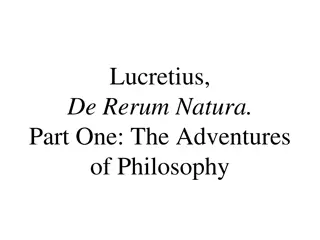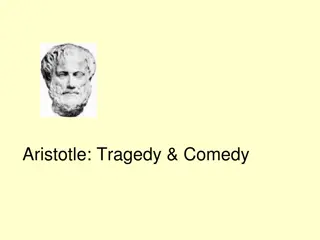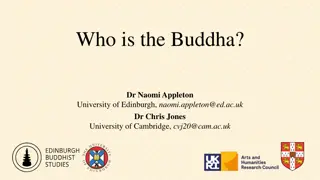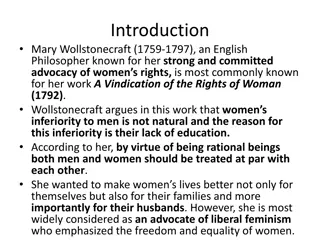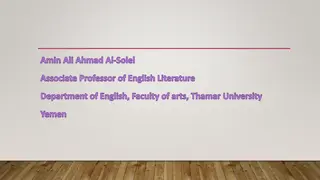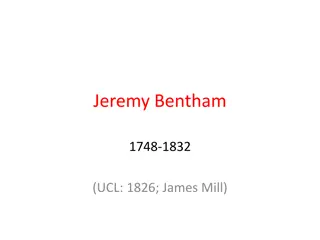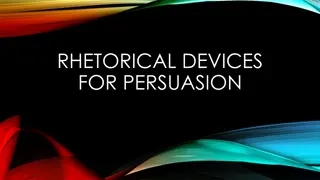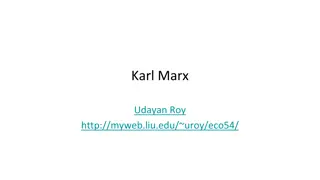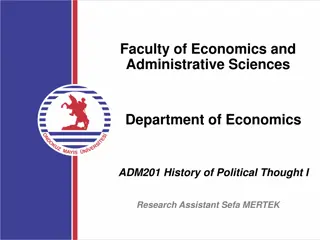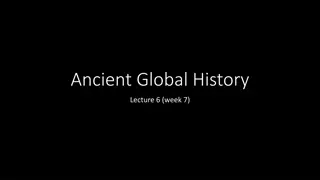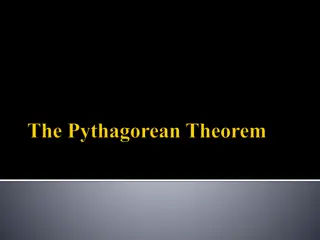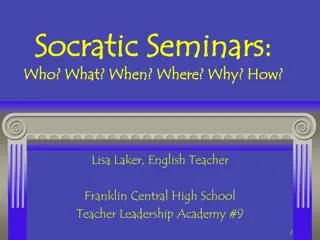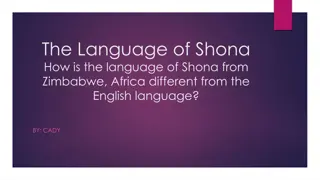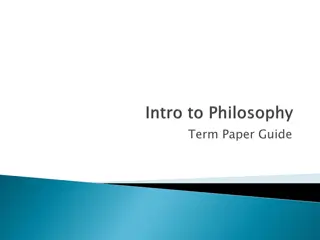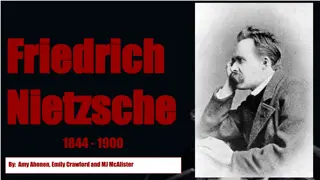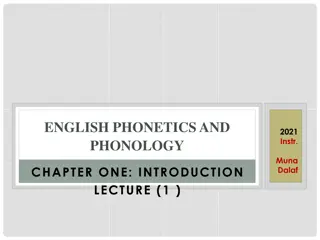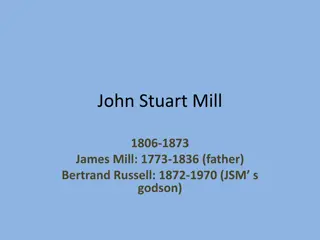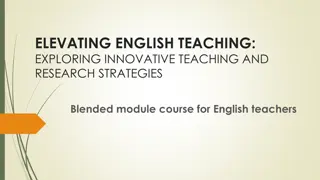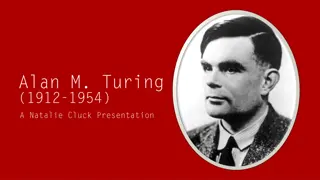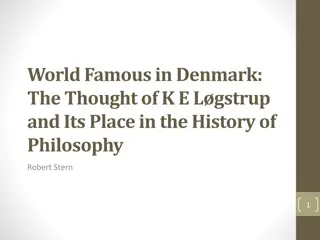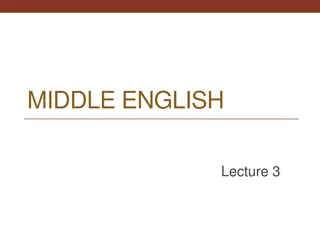Mastering English: A Comprehensive Approach to Teaching Language Skills
Education is not just preparation, but life itself. English language holds a vital place in our educational system and national life. This presentation explores the aims and objectives of teaching English, emphasizing the importance and impact of mastering the language at different education levels.
5 views • 32 slides
Exploring Lucretius and De Rerum Natura: Philosophy, Poetry, and Materialism
Delve into the life and works of Roman philosopher and poet Lucretius, particularly his masterpiece "De Rerum Natura." Discover the blend of philosophy and poetry, the essence of atomistic materialism, and the themes of explanation, free will, and mortality explored in his writings.
3 views • 24 slides
The Etymology of Modern English Vocabulary: A Detailed Analysis
The etymology of modern English vocabulary explores words of native Anglo-Saxon origin, Germanic borrowings, and English elements, examining their characteristics and assimilation into the language. It delves into the ways borrowing occurs, criteria for assimilation, and the distinct layers comprisi
8 views • 15 slides
Evolution of English Literature: From Old English to Beowulf
The English language, evolving over 1,400 years, transitioned from Old English to Middle English with works like Beowulf standing as a pinnacle of Old English literature. The epic poem tells the tale of Beowulf's heroic feats in pagan Scandinavia, showcasing elements of alliteration, a key literary
0 views • 46 slides
Aristotle's The Poetics: Tragedy and Comedy Analysis
Aristotle, the Greek philosopher, introduced key concepts in his work The Poetics, focusing on tragedy and comedy. He countered Plato's views on literature and emphasized the importance of imitation, catharsis, and the unity of time, place, and action in dramatic composition.
0 views • 32 slides
Exploring the Buddha: Historical Figure, Philosopher, and Social Reformer
Dive into the multifaceted exploration of the Buddha as a historical figure, philosopher, and social reformer in a series of sessions led by experts from the University of Edinburgh and University of Cambridge. Discover the significance of the Buddha in Buddhist practice, his portrayal in modern Bri
0 views • 11 slides
Stories of Honesty and Wisdom from History
Discover tales of honesty and wisdom in historical settings through rearranging sentences to create coherent stories. Explore the accounts of an honest tax collector appointed by a Sultan and the intellectual journey of the renowned philosopher Aristotle under the mentorship of Plato.
0 views • 20 slides
Exploring the Intersection of Arabic and English Language Learning
Delve into the fascinating world where Arabic and English intersect, with a focus on language learning patterns, the brain's process of acquiring new information, essential driving patterns, English pronunciation, and the intriguing history of the English language's phonetic alphabet. Discover the c
0 views • 24 slides
Women's Rights Advocacy in Historical Perspective
Mary Wollstonecraft, an English philosopher known for her advocacy of women's rights, particularly in her work "A Vindication of the Rights of Woman," challenged the notion of women's inferiority and lack of education. Her ideas laid the foundation for liberal feminism and influenced feminist moveme
0 views • 21 slides
Challenges and Perspectives in Academic Writing for English Students: Insights from Yemeni Education System
Amin Ali Ahmad Al-Solel, an Associate Professor of English Literature at Thamar University in Yemen, shares insights on the challenges faced by English learners in Yemen. From outdated curriculum and lack of resources to struggles with writing skills, the educational system in Yemen poses significan
0 views • 14 slides
Mary Wollstonecraft: British Feminist Writer and Philosopher
Mary Wollstonecraft (1759-1797) was an influential British writer and feminist known for her work, "A Vindication of the Rights of Woman." Her life was marked by controversial relationships and she married philosopher William Godwin. Despite her untimely death at 38, Wollstonecraft's advocacy for wo
0 views • 14 slides
Importance of Teaching English at Different Education Levels
English language holds a significant position in the educational system and national life of India. This presentation by Dr. A. Mary Delphine highlights the aims and objectives of teaching English, emphasizing its importance in India and the modern world. The objectives include understanding the rat
1 views • 32 slides
Exploring Jean Jacques Rousseau's Political Philosophy
Jean-Jacques Rousseau, an influential political philosopher, was born in 1712 in Geneva, known for his works that inspired the French Revolution. His diverse talents ranged from writing to music composition. Rousseau's writings, including "The Social Contract" and "Emile," address themes of politica
0 views • 21 slides
Jeremy Bentham and Utilitarianism: A Vision for Social Reform
Jeremy Bentham, a prominent philosopher of the 18th and 19th centuries, advocated for utilitarianism, which states that the greatest happiness of the greatest number should be the measure of right and wrong. He proposed the concept of the Panopticon as a new mode of obtaining power over individuals.
2 views • 13 slides
Mastering Rhetorical Devices for Persuasion
Understand the art of rhetoric and the power of persuasion through ethos, pathos, and logos. Explore how writers use varying techniques like formal word choice, emotional appeal, and allusion to sway audiences. Delve into the persuasive appeals of ethos, pathos, and logos as explained by Greek philo
0 views • 12 slides
Understanding John Locke's Philosophy on Knowledge and Innate Ideas
John Locke, a prominent philosopher, delved into the concept of knowledge, emphasizing certainty and instructiveness. He defined knowledge as perceiving connections or disparities of ideas, distinguishing between innate ideas and those acquired externally. Locke believed innate ideas were not univer
0 views • 8 slides
Karl Marx: The Revolutionary Thinker and Philosopher
Explore the life and theories of Karl Marx, a prominent figure in political philosophy and economics. Discover his works such as "Capital" and "The Communist Manifesto," as well as his theory of history and dialectical materialism. Learn about the impact of technology and power on the mode of produc
0 views • 42 slides
The Life and Contributions of Plato: A Historical Overview
Plato, a Classical Greek philosopher and mathematician, played a significant role in shaping Western philosophy and science. Born around 427 B.C. in Athens, he was influenced by his mentor Socrates and later founded the Academy in Athens. Plato's works such as "The Republic" and "The Laws" are renow
0 views • 45 slides
The Axial Age: Pivotal Thinkers Across Ancient Civilizations
The Axial Age, coined by Karl Jaspers, refers to a period from the 8th to 3rd century BCE where pivotal thinkers emerged independently in Persia, India, China, Greece, and Rome, shaping the spiritual foundations of humanity. Jaspers, a German philosopher and psychiatrist, highlighted the importance
2 views • 21 slides
Exploring the Pythagorean Theorem and Its Origins
The Pythagorean Theorem, named after the ancient Greek mathematician Pythagoras, is a fundamental principle in geometry relating to right triangles. While Pythagoras is credited with offering a proof of the theorem, evidence suggests that earlier civilizations like the Babylonians and ancient Chines
0 views • 21 slides
Chinese Philosopher Smackdown: Deep Dive into Philosophical Quotes
Explore a riveting discussion on various philosophical quotes with insightful interpretations and connections made by participants. Delve into the essence of government, society, power, wisdom, responsibility, and more through thought-provoking reflections on renowned philosophical statements.
2 views • 14 slides
The Wisdom and Humor of Nasreddin Hodja: A Legendary Folk Philosopher
Nasreddin Hodja, born in 1208, was a folk philosopher known for his wisdom and humor. His teachings reflect his unique worldview, offering insights through anecdotes that tackle extremism and everyday life events. Stories of Nasreddin Hodja have spread worldwide, emphasizing the depth and meaning be
0 views • 7 slides
The Linguistic Impact of French Influence on the English Language
The Normans contributed over 10,000 words to the English language, shaping vocabulary related to government, authority, fashion, art, and more. The integration of French and Old English words led to the evolution of language during this period, with some words persisting while others were replaced o
0 views • 12 slides
Plan and Execute a Successful English Day Event for 5th and 6th Grade Students
Dive into the details of organizing an English Day event for 5th and 6th grade students, including tips on event planning, activity design, and engaging non-English speaking students. Learn about the importance of clear instructions, teamwork, and effective communication with teachers to make the ev
0 views • 14 slides
Exploring the Essence of Socratic Seminars in Education
Delve into the world of Socratic Seminars led by Lisa Laker, an English Teacher at Franklin Central High School. Discover the profound impact of Socrates, the eminent philosopher, and learn about the core elements and benefits of engaging in Socratic Seminars in educational settings. Uncover the sig
0 views • 26 slides
Contrasting Shona and English Languages in Zimbabwe
The language of Shona in Zimbabwe, Africa, differs from English in various aspects such as script symbols, alphabet, official usage, borrowing of words, and number of speakers. Shona has a script with 35 symbols, while English has a 26-letter alphabet. English is the official language of the USA, wh
0 views • 5 slides
Comprehensive Guide to Writing a Philosopher Research Term Paper
In this detailed term paper guide, learn how to write a 4-6 page paper on a philosopher's life and work. Covering biography, philosophical contributions, and citation styles such as MLA, APA, or Chicago Manual. Get step-by-step instructions on structuring your paper, including sections on introducti
0 views • 18 slides
Friedrich Nietzsche - Philosopher and Thinker Extraordinaire
Friedrich Nietzsche, a renowned German philosopher, cultural critic, and essayist, challenged traditional Western morality and Christian beliefs. He advocated for personal reflection in philosophy, rejected societal norms, and introduced existentialist ideas that emphasized individual freedom and re
0 views • 10 slides
Understanding English Phonetics and Phonology: An Introduction
The study of English phonetics and phonology is essential for understanding the physical characteristics of human speech sounds and their distribution in language systems. Phonetics focuses on the sounds themselves, while phonology delves into their classification and patterns within a language. Key
0 views • 8 slides
Influence of Indian English in "The Jewel in the Crown" by Rochana Jayasinghe
Indian English plays a significant role in the Indian subcontinent with 200 to 333 million English speakers. India is a key player in the English language landscape, publishing more books in English than any other language. The British Raj from 1858 to 1947 shaped the prominence of English in India,
0 views • 18 slides
Biography of Francis Bacon: English Philosopher and Statesman
Francis Bacon, also known as Lord Verulam, was a prominent English philosopher and statesman who significantly contributed to the development of the scientific method. Born in 1561 to a notable family, Bacon's early education and legal career laid the foundation for his influential role in English p
0 views • 12 slides
John Stuart Mill: Philosopher of Liberty and Utilitarianism
John Stuart Mill (1806-1873) was a prominent British philosopher known for his contributions to the principles of liberty and utilitarianism. He advocated for individual freedom and emphasized the importance of self-protection as the justification for societal interference. His work "On Liberty" exp
0 views • 10 slides
Elevating English Teaching: Blended Course for Innovative Strategies
Explore an innovative blended course designed for English teachers to enhance teaching quality through online resources, digital tools, action research, and active learning strategies. The course includes modules on applying digital tools, action research in English instruction, and active learning
0 views • 15 slides
Alan Turing: Mathematician, Cryptanalyst, and Computer Science Pioneer
Alan Turing, an English mathematician, cryptanalyst, logician, philosopher, and pioneer in computer science, played a crucial role in deciphering German Enigma encrypted messages during World War II. He is known for his work on the Turing machine, considered the foundation of theoretical computer sc
0 views • 6 slides
GCSE English Language and Literature Overview
GCSE English Language and Literature subjects are led by Mrs. A. Baker and Mr. Doodson. English Language is examined by OCR, while English Literature is examined by Edexcel. Both subjects have two examination papers worth 100% of the grade. English Language papers focus on reading and writing skills
0 views • 14 slides
Løgstrup: A Closer Look at the World-Famous Danish Philosopher
Løgstrup, a renowned philosopher from Denmark, is well-respected in his homeland but relatively unknown outside Scandinavia. This article delves into his life, influences, works, and the key concept of the ethical demand, which he explores in a non-religious context. It raises questions about the e
0 views • 33 slides
Choosing the Right English Course for Your HSC: Advanced, Standard, or Studies?
When preparing for the HSC, selecting the appropriate English course is crucial as it is compulsory. Options include Advanced English, Standard English, and English Studies, each offering unique benefits. Advanced English challenges students with higher-order thinking skills, while Standard English
0 views • 25 slides
Understanding Middle English Evolution
The Middle English period began after the Norman invasion of 1066 and extended to the mid-15th century, witnessing significant linguistic changes influenced by Scandinavian and Norman French languages. This era saw alterations in phonology, morphology, syntax, and vocabulary, reflecting the impacts
0 views • 30 slides
English Learner Advisory Committee (ELAC) Guidelines and Responsibilities
This document provides information on the English Learner Advisory Committee (ELAC), including its formation, purpose, and responsibilities. ELAC is a crucial component of schools with a significant English learner population, ensuring parent representation and input in decision-making processes rel
0 views • 29 slides
Exploring English Literacy in a Brave New World
Delve into the realm of English literacy beyond traditional syllabuses and evaluations, as Geoff Barton discusses the evolving landscape of teaching English and its impact on students' progress and perception. The presentation covers crucial aspects like distinctive teaching methods, unique offering
0 views • 86 slides

